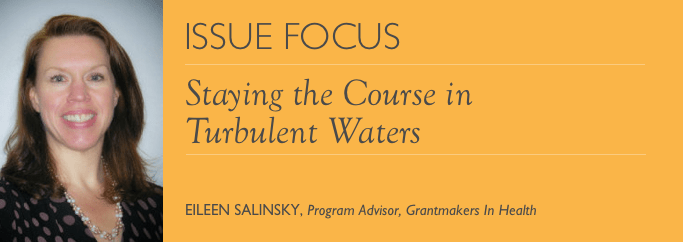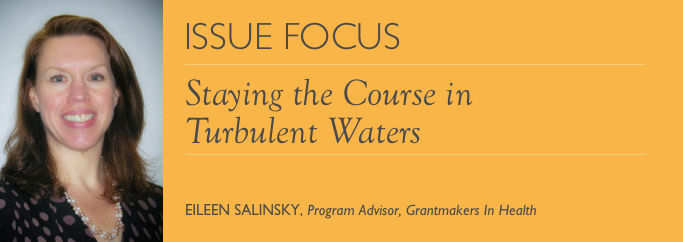November 2017

Managing change is hard, but managing uncertainty can be even harder. This sentiment captures the challenges health funders have faced while navigating the roiling health policy debates of the 115th Congress. When the Affordable Care Act (ACA) was enacted in 2010, many health funders invested significant philanthropic resources to support the law’s successful implementation. Despite enrollment problems and a Supreme Court decision that left Medicaid expansion optional for states, insurance coverage has risen to a historically high level. Given this progress, some health funders had begun to shift their focus to other priorities. Then, the results of the 2016 presidential election upended the political status quo and led to shifting, and still unresolved, maneuvers regarding the future of ACA coverage reforms and federal Medicaid funding.
Between February and August of 2017, GIH interviewed the leaders of 20 state-level health foundations to gain a better understanding of how health foundations and corporate giving programs were adapting their grantmaking to the new political landscape, with a particular emphasis on legislative efforts to repeal and replace the ACA. During this time frame, the prospects for new legislation ebbed and flowed, but the strategic direction of health funders remained largely consistent.
Although a few health funders reported major reallocations of grantmaking budgets, most funders described a “stay the course” response. Acknowledging the need for some tactical adjustments, health foundations have remained faithful to their established grantmaking strategies. A few key messages emerged from our conversations:
State-level health funders have maintained or increased grant support for advocacy. Nearly all of the health funders interviewed have a track record of supporting policy advocacy related to health reform. While most report steady funding for advocacy activities in 2017, approximately one-quarter of respondents indicated that they increased advocacy funding in light of ACA concerns. Nearly all of those reporting increased support for advocacy grants were located in Medicaid-expansion states.
Flexibility for grantees has proved to be critically important. While funders did not report significant shifts in grantmaking priorities, they recognized that grantees might need to refocus their work. Respondents expressed a high level of trust in the ability of advocacy grantees to adapt and described a variety of approaches they pursued to ensure that grantees had the flexibility needed to respond to the changing political dynamic. For example, one funder conducted a comprehensive review of its entire funding portfolio and engaged with grantees to determine if modifications to existing grant agreements would be beneficial. Others expedited grantmaking, such as through rapid response funds, to make resources available in a timely fashion. Several funders noted the value of providing general operating support to advocacy organizations, which allows grantees to pivot operations quickly without renegotiating grant terms.
Funders have supported ACA advocacy in a variety of ways beyond grantmaking activities. Health philanthropy relies on a broad range of policy strategies beyond grantmaking. Many interview respondents stressed the important role their foundations played in leveraging non-grant resources—such as foundation staff expertise, reputational assets, and contractual agreements—to inform the ACA repeal debate. These efforts include:
- commissioning objective research and analyses to document the effects of ACA reforms, model the benefits and costs of Medicaid expansion, and assess the projected impact of repeal and replacement proposals;
- convening grantees and other stakeholders to facilitate timely response and coordination among advocates;
- collaborating with other funders to efficiently mobilize resources; and
- using the foundation’s “voice” to amplify opposition to proposals that would undermine Medicaid, threaten protections for preexisting conditions, increase insurance premiums in the individual market, and erode insurance coverage.
Most state-level health funders continue to support ACA outreach and enrollment. Most of the state funders interviewed (about 70 percent) have supported outreach and enrollment at some point during ACA implementation. The majority of these funders plan to maintain or increase support for these activities in the future, but some (about 20 percent) have decided to scale back support for outreach and enrollment. These funders made the decision to decrease or eliminate support for outreach and enrollment prior to the 2016 election largely due to perceptions that such activities were adequately supported through other mechanisms.
Funders are deeply concerned about the viability of the health care safety net. Recognizing that the per capita Medicaid caps included in ACA repeal proposals represent a radical change to the Medicaid program, health funders are keenly focused on the financial stability of the health care safety net. Some health foundations have established funding opportunities designed to help safety net providers prepare for potential cuts in public financing. However, interview respondents caution that philanthropic dollars will never be able to fill the gap that would be created by massive cuts to federal Medicaid funding.
Threats to coverage expansion have slowed, but not derailed, shifts to emerging priorities. Health foundations are adopting an increasingly expansive view of their mission to improve population health. While the beginning of this trend largely preceded the ACA’s passage, coverage expansions have further encouraged health foundations to shift their sights beyond a traditional focus on access to health care services. This shift in priorities has meant different things to different foundations. Some are striving to increase the quality and efficiency of health care services, promoting prevention-oriented and patient-centered care. Others are focusing on the “upstream” factors that influence health outcomes, such as economic security, safe housing, and access to healthy foods. Others are framing these goals explicitly as health equity strategies, working to address the inequities borne by communities of color and low-income populations. ACA repeal efforts have not caused funders to back away from these broader priorities. Some respondents acknowledged that they might have made larger investments in these areas absent uncertainty related to the ACA. However, no foundation identified specific programs or initiatives that were significantly diminished due to competing ACA advocacy needs.
State-level health foundations are strongly supportive of policy advocacy to protect the coverage expansions and access improvements achieved through ACA reforms. Funders recognize that policy engagement requires a long-term vision—and long-term funding. Many have embraced an advocacy field-building strategy, seeking to build adaptive capacity that can effectively respond to shifting political dynamics. This approach depends on flexible funding, trusting relationships with grantees, and a willingness to deploy foundations’ non-grant resources to advance policy change.
Topics:

